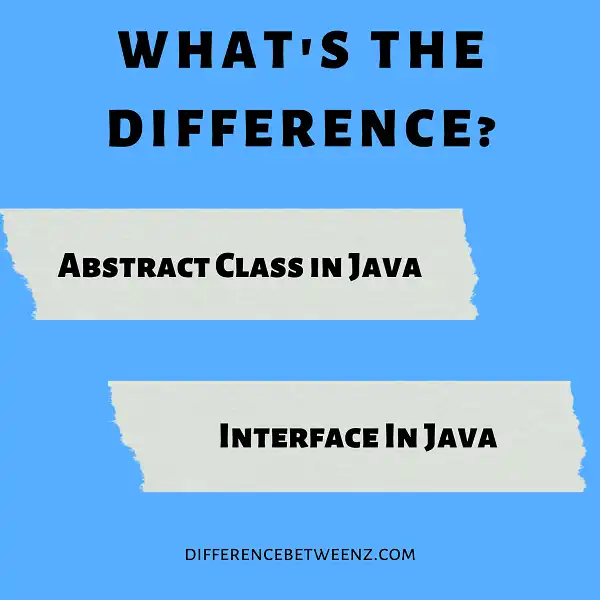In Java, an interface is a type of class. It is used to define a set of methods that a class must implement. An abstract class is also a type of class, but it can only be used to define behavior. It cannot be instantiated. Let’s take a closer look at the differences between interfaces and abstract classes in Java.
What is Abstract Class in Java?
Abstract Class in Java is a class that cannot be instantiated and needs to be implemented by other classes. Abstract Class contains Abstract methods, these Abstract methods need to be implemented by the class which is implementing the Abstract Class. Let’s take a simple example to understand Abstract Class better.
- A class that has only abstract methods is known as Abstract Class. Abstract methods are the methods which doesn’t have implementation. It can only have a method signature, nobody.
- If you want to create an Abstract method, you need to precede it with the keyword “abstract”. You cannot instantiate Abstract Class, which means you cannot create an object of Abstract Class.
- An Abstract class can contain both abstract and non-abstract(concrete) methods. If a class having even a single abstract method must be declared as an abstract class.
What is Interface in Java?
An Interface in Java is a language construct that allows you to specify a set of methods that must be implemented by a class. Interfaces are useful for defining contracts between different components of a system.
- For example, if you have a class that represents a database connection, you might create an interface that defines methods for opening and closing the connection, executing queries, and so on.
- By doing this, you can ensure that any class that implements your interface will provide the required functionality. Interface are also useful for creating polymorphic objects.
- For example, if you have a class that represents a Shape, you could create an Interface that defines methods for drawing the shape and calculating its area.
Then, any class that implements the Interface (such as Square, Rectangle, and Circle) can be used interchangeably by code that only knows about the Interface. This makes it easy to change or extend the behavior of your code without having to make changes to the code that uses the Interface.
Difference between Abstract Class and Interface in Java
Abstract class and Interface are two important concepts of java that are used to achieve abstraction. An abstract class is a class that is declared using the keyword “abstract”. An abstract class cannot be instantiated. That is, we cannot create an object of an abstract class.
- An abstract class can have both abstract and non-abstract methods. Abstract methods are methods that are declared but not implemented in the Abstract Class. They need to be implemented in the sub-classes. The interface is also used for achieving abstraction.
- But it is different from Abstract Class in the way that an Interface can have only abstract methods and all the methods have public access modifier by default. We cannot create an object of Interface.
- An abstract class can have instance variables whileInterface cannot have instance variables. An abstract class can have a constructor while Interface cannot have a constructor.
An abstract class can have static methods while Interface cannot have static methods. Members of the Abstract Class can be final, static, and private while members of the Interface cannot be static and private.. Interfaces are more flexible than Abstract classes as they can support multiple inheritances.”
Conclusion
In Java, an abstract class can be thought of as a template for creating classes. An abstract class is not meant to be instantiated on its own, but rather subclassed and used as the basis for other classes. An interface, on the other hand, is pure abstraction; it cannot contain any implementation details. It is simply a collection of method declarations that must be implemented by any class that implements the interface. So which should you use in your code? The answer depends on what you want to achieve. If you need a base class that will be subclassed and has some concrete functionality, use an abstract class. If you just need a collection of methods that must be implemented by your classes, use an interface.


